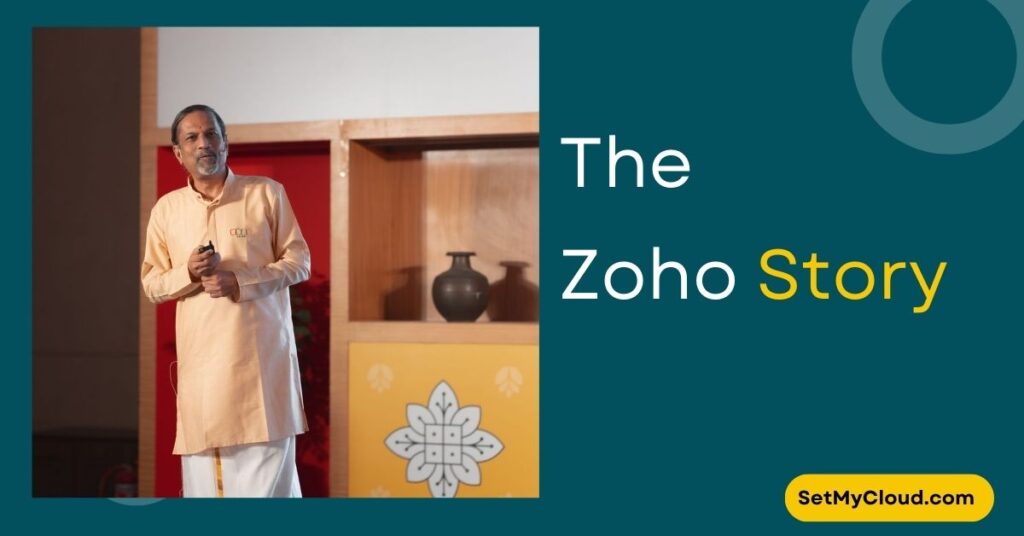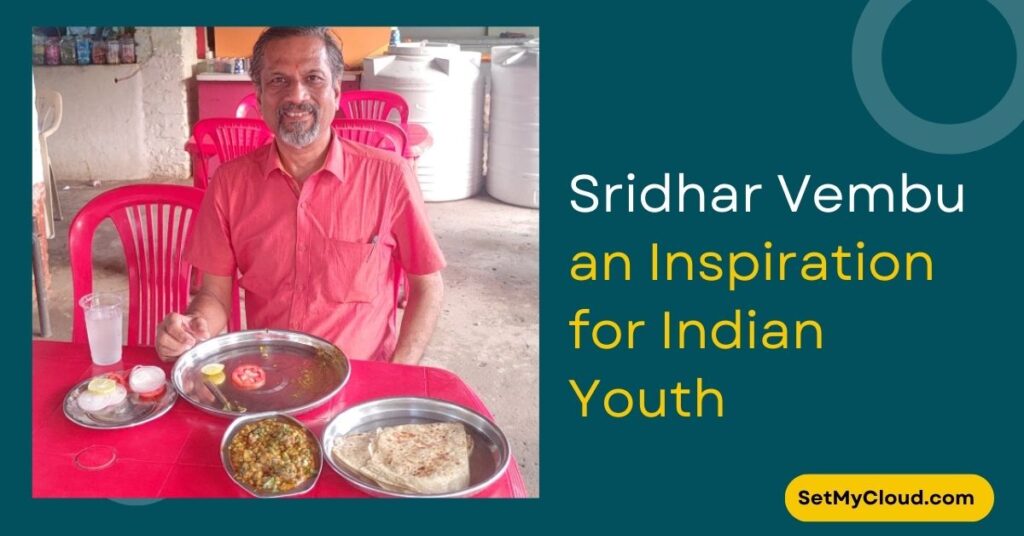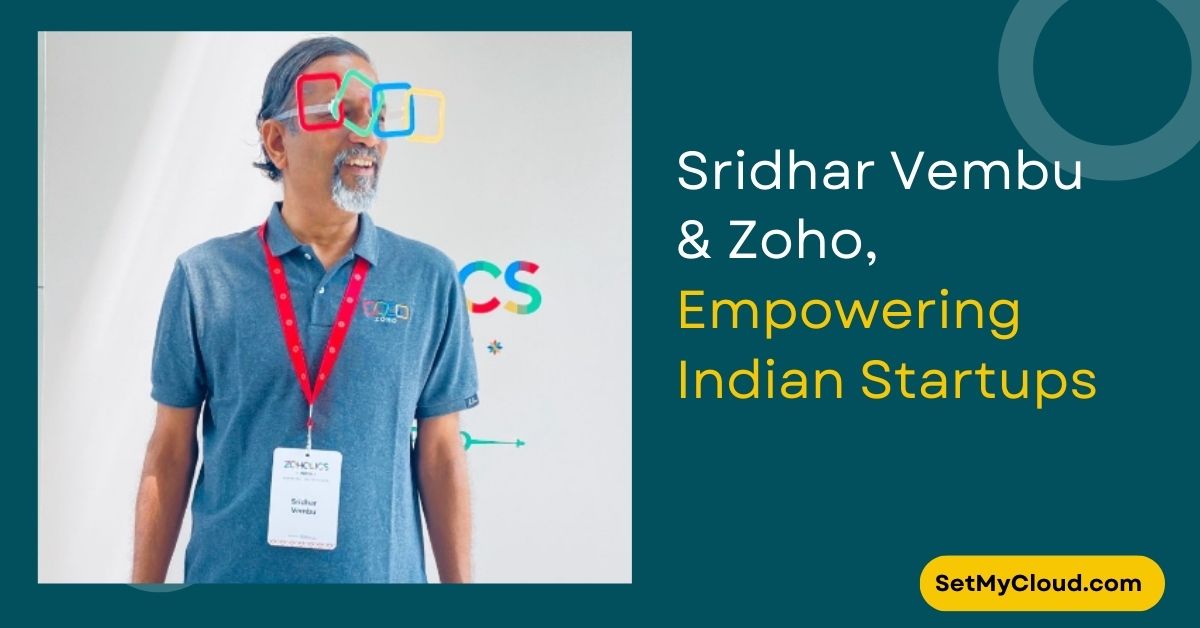Zoho is a global software company that provides a wide range of cloud-based business applications and software solutions. It is known for its comprehensive suite of applications that cater to businesses of all sizes, from small startups to large enterprises. Founded by Sridhar Vembu in 1996, Zoho is headquartered in Chennai, India, with a significant global presence.
The Zoho Story

The story of Zoho is an inspiring tale of resilience, innovation, and a vision to create world-class software from India. Here’s a look at the journey of Zoho and its founder, Sridhar Vembu:
Humble Beginnings (1996)
Zoho was founded in 1996 as AdventNet by Sridhar Vembu and Tony Thomas. Initially, it was a network management company focused on catering to telecom equipment vendors. The company started in Chennai, India, and bootstrapped its way through the early years without any external funding. Vembu, a graduate from IIT Madras and Princeton University, was driven by a deep belief in the potential of Indian talent and his vision of building products from India for the global market.
Pivot to SaaS (2009)
By the early 2000s, AdventNet faced a challenge: the telecom bubble burst. Rather than giving up, Sridhar Vembu and his team decided to pivot. They realized the growing importance of software in helping businesses manage operations and saw an opportunity in the emerging Software as a Service (SaaS) space. In 2009, the company rebranded as Zoho Corporation, shifting its focus from network management to providing cloud-based software solutions.
Zoho CRM: The Breakthrough Product
One of Zoho’s early successes was Zoho CRM, a tool to help businesses manage customer relationships. It was a major hit, especially with small and medium businesses (SMBs), providing powerful tools at an affordable price. Zoho CRM became the cornerstone of the company’s suite of business applications, gaining popularity globally.
Bootstrapped Success
Unlike many tech companies, Zoho took an unconventional path by not seeking venture capital. Sridhar Vembu was determined to grow the company organically, relying on its own revenue and maintaining full control. This bootstrapped approach paid off, allowing Zoho to scale while remaining profitable. Vembu’s philosophy of frugality and long-term sustainability resonated deeply with entrepreneurs who saw him as a role model for building a company without depending on investors.
Expansion of the Product Suite
Over the years, Zoho expanded its product offerings into nearly every aspect of business operations. The company launched over 50 applications under its Zoho One suite, including solutions for:
- CRM and Sales
- Marketing automation
- Human resources management
- Accounting and finance
- Project management
- Customer support
Zoho’s integration across its products created a seamless experience for businesses, giving them access to an all-in-one ecosystem.
Global Success with Local Roots
Despite its global success, Sridhar Vembu made a bold move to decentralize Zoho’s operations. He returned to a rural village in Tamil Nadu and started running parts of the company from there. His focus on empowering rural India by creating local employment opportunities and leveraging untapped talent was groundbreaking. It emphasized that world-class software could be built from anywhere, not just from tech hubs like Silicon Valley.
Zoho University (Zoho Schools of Learning)
To address the talent gap and avoid the constraints of traditional education, Zoho launched Zoho University, now called Zoho Schools of Learning, which trains students directly out of high school. This initiative allowed Zoho to develop a skilled workforce while giving young talent an alternative to expensive formal education. It became a symbol of Vembu’s commitment to nurturing local talent and creating opportunities for those without formal degrees.
Competing Globally
Zoho’s products compete with global tech giants like Google, Microsoft, and Salesforce. What sets Zoho apart is its ability to offer powerful, integrated software at affordable prices, making it accessible to businesses of all sizes, especially in emerging markets. Today, Zoho serves 80+ million users across 180+ countries.
Inspiring Indian Startups
Zoho’s success has inspired a wave of Indian SaaS startups. Sridhar Vembu’s journey demonstrated that a world-class tech company could be built from India without relying on external funding. His leadership has encouraged many entrepreneurs to think beyond local markets and aim for global success while staying rooted in their values.
Zoho Today
Today, Zoho is one of the most successful SaaS companies globally, with a presence in major markets like the U.S., Europe, and Asia. Its broad product suite and customer-centric approach have won the trust of millions of businesses worldwide. Sridhar Vembu, now a billionaire, remains deeply committed to his mission of empowering rural India and building products that serve a global audience.
Zoho’s story is not just about business success; it’s about a vision to build sustainably, nurture talent, and stay independent. Sridhar Vembu’s journey proves that with the right focus and values, companies can grow globally while staying rooted in their home country.
Sridhar Vembu, an inspiration for Indian startups

Zoho’s founder, Sridhar Vembu, has indeed been an inspiration for Indian startups, particularly in the SaaS (Software as a Service) space. Zoho’s journey from a small Indian company to a global player has shifted the mindset of many Indian entrepreneurs, showing that it is possible to build a successful, world-class software product from India. Here’s how Sridhar Vembu brought confidence into the Indian startup ecosystem:
- Focusing on Talent in India: Vembu believed in the potential of Indian talent, especially from Tier 2 and Tier 3 cities. Zoho hired and trained local talent, proving that world-class products could be developed without relying on outsourcing or moving to Silicon Valley.
- Bootstrapped Success: Unlike many startups that depend on venture capital, Zoho was bootstrapped and still achieved global success. This self-sustaining model of growth demonstrated that with the right strategy, it is possible to succeed without external funding, creating a new level of confidence for Indian entrepreneurs.
- Product Excellence & Innovation: Zoho’s comprehensive suite of cloud-based applications competes with global giants like Google and Microsoft. Vembu’s focus on product innovation and customer-centric solutions, especially in fields like CRM, ERP, and IT management, has made Zoho a trusted name worldwide.
- Global Vision with a Local Base: Vembu maintained a global vision while keeping the company deeply rooted in India. By doing so, Zoho was able to maintain cost-efficiency while also competing on a global scale, proving that high-quality software could be built in India for international markets.
- Social Impact and Sustainability: Sridhar Vembu’s decision to move back to a rural part of Tamil Nadu and run operations from there highlighted the importance of decentralization and sustainable business practices. This move not only empowered rural India but also sent a message to entrepreneurs that businesses can thrive beyond traditional tech hubs.
- Inspiring a Generation of Indian SaaS Startups: Zoho’s success has inspired numerous SaaS startups like Freshworks, Chargebee, and others to follow in its footsteps, making India one of the leading SaaS hubs globally.
Vembu’s leadership and Zoho’s success have become symbols of India’s rising tech prowess, instilling confidence in Indian entrepreneurs that they too can build global SaaS businesses without compromising on their roots.
